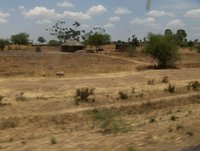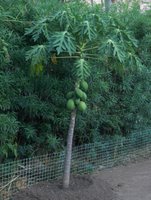A bit of a beginning...
Hi! So it is Saturday, September 30th, and I can’t believe it. I have been here now for 2 weeks and 4 days. In some ways the time has flown by, and I feel that I have been here for years and can’t really imagine anything else right now. Then on the other hand I judge the amount of things I have done and realize I really do have so much more to learn about life in Tanzania in terms of, well, everything. I am still (and I think any white person is and would always be) overwhelmed in the market place, having people shouting ‘Mzungu’ and having little boys trying to carry my basket of vegetables for me so they can make a few shillings. I recognize two boys in the market place, Omal and John, so that is comforting that they will always come and find me, and whats a few cents to give someone to carry a basket for me- probably safer than me carrying it myself!! Yesterday I (with Mama Mary, the kitchen staff here at treehouse) went down to the market…we were going to go today but we heard news that there may be a riot today- a riot similar to one that happened in February in which the police aimed to get all the Jukas (I have no idea if that’s the right word- but the people selling anything from shoes to soap etc on the side of the road on tarps) off of the road…and quite violently I might add. So we made a wise decision to go on Friday instead. As well, being overwhelmed in the market includes having people shouting in Kiswahili, still foreign to my ears, come here, look at my grapes, look at my pinapples, but my oranges….all from about 100 directions…and being white, that generally means I am paying a higher price, and once one woman selling oranges asks for a price, that’s what they will all ask for- they are like a team vs. the white person with money. Haha. But anyways…that’s just a quick run down…I love it though, all the people and just seeing how they all work together- chaotic but there is order in it- there will always be a group of men barging by carrying a bag of freshly but grass or pushing you over as they carry a newly made bed frame or something! So many things to see!
Anyways the point of this blog entry is to tell you the progress on my work. I am learning patience and not to worry about how things progress around here. A meeting planned for last Wednesday may well happen the next week, depending on power, phone service and transportation. This week though I, along with Steve and Jan (my CRWRC ‘supervisors’) worked on planning some good old PRA or RRA or PAR ( we like discussing what in the world to call it exactly, but with the words Rapid, Rural, Appraisal and most importantly, PARTICIPATORY) to use as research alongside the data that I will eventually be working with. It is exciting and I can’t believe that I can be a part of it. As I myself am still wrapping my head around it, I will tell you the basics. We (Jan and I, along with Mr Pamba (an elderly man working with the Buhumbi Village GMHP (Growth Monitoring Health Program, from which the data I will be working with is from, about the health of children under 5)) who also works with agriculture along with Steve) plan to do some Participatory research gathering in the Buhumbi village. As of now, we are still waiting to meet with Mr Pamba for a pre-meeting, as he will be the one asking most of the questions of the women participating. You can imagine some frustration on my part as I understand little Kiswahili and no Sakuma (which is the tribal language they speak in Buhumbi) but am still so thankful that I can go along and observe and be the photographer.
The aim of this research will be to gather information such as rainfall and harvest as a trendline over the past 10 years, to gather information for an average year about what is grown and eaten from women’s kitchen garden (with chakula bora “healthy food”), which child sicknesses are prevalent in which months, what a typical child is fed each year until they are 5 years old, as well as asking information such as how long each ‘interviewee’ has been a part of the GMHP with her children, and the families sources of food (such as crops, storage, or buying the food). All of this information I will attempt to sort through and look for how it relates to the trendlines (to be created with the GMHP data) and insights from the data about the health of the children per month over the last 10 years.
I have come to a few conclusions before beginning this undertaking:
-I am so thankful that Jan is helping (she has worked in Africa many years as well as doing PRA)
-This project seems that it could inflate into a huge undertaking if I am not careful to write and maintain objectives
-I am allowed to relax and take time to enjoy the different world around me, and learn some Swahili and enjoy the people
- I am still very tired and hope it stops soon!
-I am going to have to learn to allow God to work through me, to be attentive to others, to let Him help me understand how this will all fit together and give me creativity…to make His power perfect in my weakness





